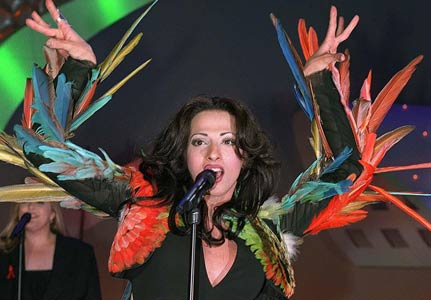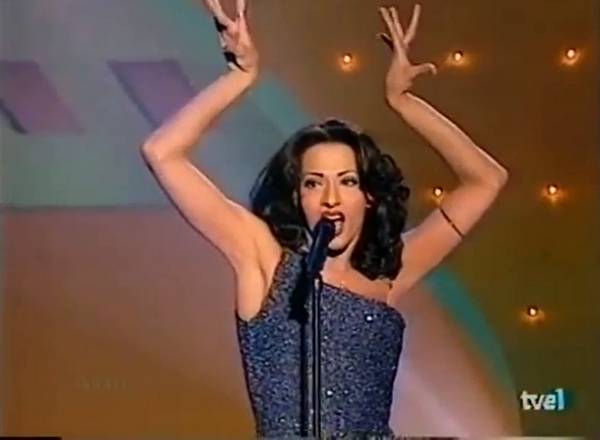Interview | Dana International reflects on winning Eurovision Song Contest back in 1998
The Diva singer won the competition when it was held in Birmingham
By Steve Brown

It’s 20 years since Dana International changed the world by becoming the first transsexual to win the Eurovision Song Contest with her hit Diva.
After having a history as a drag queen, the singer – whose real name is Sharon Cohen – transitioned in her teens and before winning the 1998 contest, she had a successful recording career in Israel.
Fast forward 16 years later and in 2014 drag performer Conchita Wurst snatched the coveted trophy while representing Austria despite attempts at being censored by Russia.
But now, Dana has revealed she has a huge fan base in Russia and was even allowed to perform in the Kremlin but claims it is because they don’t present her as a transsexual.
What was it like to win Eurovision 20 years ago?
Wow, it was like a dream come true. I can’t express the feeling, the energy – I was shivering, I was so happy. And I have never been as happy since that moment.
It is a blessing and it is a curse, because it is just Eurovision, but when I came from a Middle Eastern country to Birmingham, England and won the Eurovision its like I won the whole world. The feeling is so hard to express and I miss it so much.
But it is a great memory and I thank God that I have been able to travel the world for the last 20 years because of Eurovision.
What were some of the worst transphobic comments you received at the time of winning?
The worst was during the show from the director who said, ‘I don’t care if it is a he, she or it.’ And I was very offended by the use of “it”, because you can call me a he or a she, but you cannot call me an it.
Before the contest every journalist, with no exception, asked the same question, “Don’t you think because you are what you are no one is going to vote for you?” And after I won the contest the same question came in a different way, ‘Don’t you think because you are what you that is why you won the contest?’
How did you deal with the negative reaction of some Israelis?
I didn’t know if I should have been offended or laugh about it, but after winning I just felt like the queen of the world. I was travelling from city to city in Europe, I was having such a wonderful time appearing on television shows and performing. There was no time for negativity.
When I came back to Israel those who were against me before the contest, the orthodox population, they ate their hat and were no longer carrying negativity. I got a lot of respect when I got home.
What are the differences in trans discussions and acceptance now versus twenty years ago?
It is getting a little bit easier because people have seen and heard everything with social media and reality shows. There is nothing to hide, there is nothing to discover. And they become accepting and they learn the wider community is not as horrible as they thought.
How have you helped pave the way for acceptance?
I have been travelling from gay parade to gay parade, some have been very dangerous like Latvia and Poland. I talk about freedom and tolerance, and I explain my normality and myself as I see it.
What advice do you have for trans youth of today?
Think about any step seven times before you do it. Don’t rush.
And please, please, please be safe. There are high rates of HIV infection around the world because people think it is like catching a cold now.

Where is your biggest fan base outside Israel?
Russia and Spain.
Russia? Really?
You would be amazed. You know when Conchita won they were not allowed to show her on TV [in Russia]. It was a big scandal.
[After I won Eurovision] I had a very big tour in Ukraine and Russia. I was invited to perform inside the Kremlin which was a historic thing to do because not many artists are allowed to have a concert inside it.
I was shocked by how it is getting worse for the gay community in Russia. I was invited for the celebrations of Christmas in Moscow and St Petersburg for two very big festivals.
But it was like they never told them I am a transsexual. I don’t know what to think about it. Maybe they don’t present me as a transsexual.
I have done many talk shows in Moscow and no one asked me anything about being trans and maybe that’s their way to be okay with the government and rules. If they are not introducing me as a transsexual than it is okay for them. It is like it is swept under the rug.
What is a typical Eurovision night for you?
I used to have a big party but no longer because it has become such a long competition. I find myself falling asleep around 12 o’clock.
Is it true you were asked to audition for the Spice Girls?
It was at the end of the Spice Girls when they were looking to replace [Ginger Spice]. I received an invitation to audition to be a member of the Spice Girls, but I don’t know if it was really serious.
Text: Markus Bidaux
